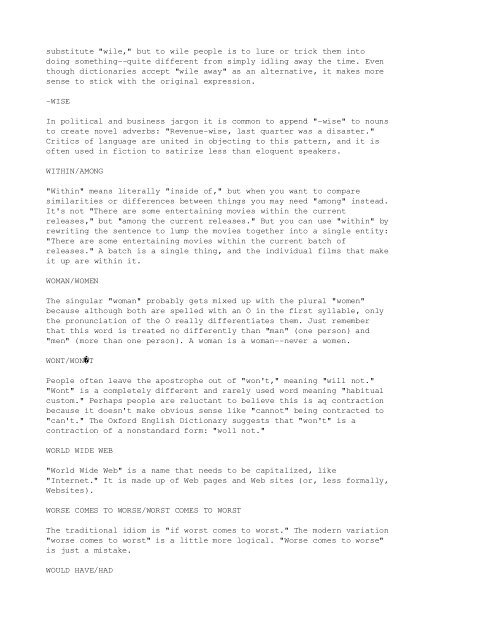Common_Errors_in_English_usage
Common_Errors_in_English_usage
Common_Errors_in_English_usage
You also want an ePaper? Increase the reach of your titles
YUMPU automatically turns print PDFs into web optimized ePapers that Google loves.
substitute "wile," but to wile people is to lure or trick them <strong>in</strong>to<br />
do<strong>in</strong>g someth<strong>in</strong>gquite different from simply idl<strong>in</strong>g away the time. Even<br />
though dictionaries accept "wile away" as an alternative, it makes more<br />
sense to stick with the orig<strong>in</strong>al expression.<br />
WISE<br />
In political and bus<strong>in</strong>ess jargon it is common to append "wise" to nouns<br />
to create novel adverbs: "Revenuewise, last quarter was a disaster."<br />
Critics of language are united <strong>in</strong> object<strong>in</strong>g to this pattern, and it is<br />
often used <strong>in</strong> fiction to satirize less than eloquent speakers.<br />
WITHIN/AMONG<br />
"With<strong>in</strong>" means literally "<strong>in</strong>side of," but when you want to compare<br />
similarities or differences between th<strong>in</strong>gs you may need "among" <strong>in</strong>stead.<br />
It's not "There are some enterta<strong>in</strong><strong>in</strong>g movies with<strong>in</strong> the current<br />
releases," but "among the current releases." But you can use "with<strong>in</strong>" by<br />
rewrit<strong>in</strong>g the sentence to lump the movies together <strong>in</strong>to a s<strong>in</strong>gle entity:<br />
"There are some enterta<strong>in</strong><strong>in</strong>g movies with<strong>in</strong> the current batch of<br />
releases." A batch is a s<strong>in</strong>gle th<strong>in</strong>g, and the <strong>in</strong>dividual films that make<br />
it up are with<strong>in</strong> it.<br />
WOMAN/WOMEN<br />
The s<strong>in</strong>gular "woman" probably gets mixed up with the plural "women"<br />
because although both are spelled with an O <strong>in</strong> the first syllable, only<br />
the pronunciation of the O really differentiates them. Just remember<br />
that this word is treated no differently than "man" (one person) and<br />
"men" (more than one person). A woman is a womannever a women.<br />
WONT/WONT<br />
People often leave the apostrophe out of "won't," mean<strong>in</strong>g "will not."<br />
"Wont" is a completely different and rarely used word mean<strong>in</strong>g "habitual<br />
custom." Perhaps people are reluctant to believe this is aq contraction<br />
because it doesn't make obvious sense like "cannot" be<strong>in</strong>g contracted to<br />
"can't." The Oxford <strong>English</strong> Dictionary suggests that "won't" is a<br />
contraction of a nonstandard form: "woll not."<br />
WORLD WIDE WEB<br />
"World Wide Web" is a name that needs to be capitalized, like<br />
"Internet." It is made up of Web pages and Web sites (or, less formally,<br />
Websites).<br />
WORSE COMES TO WORSE/WORST COMES TO WORST<br />
The traditional idiom is "if worst comes to worst." The modern variation<br />
"worse comes to worst" is a little more logical. "Worse comes to worse"<br />
is just a mistake.<br />
WOULD HAVE/HAD





